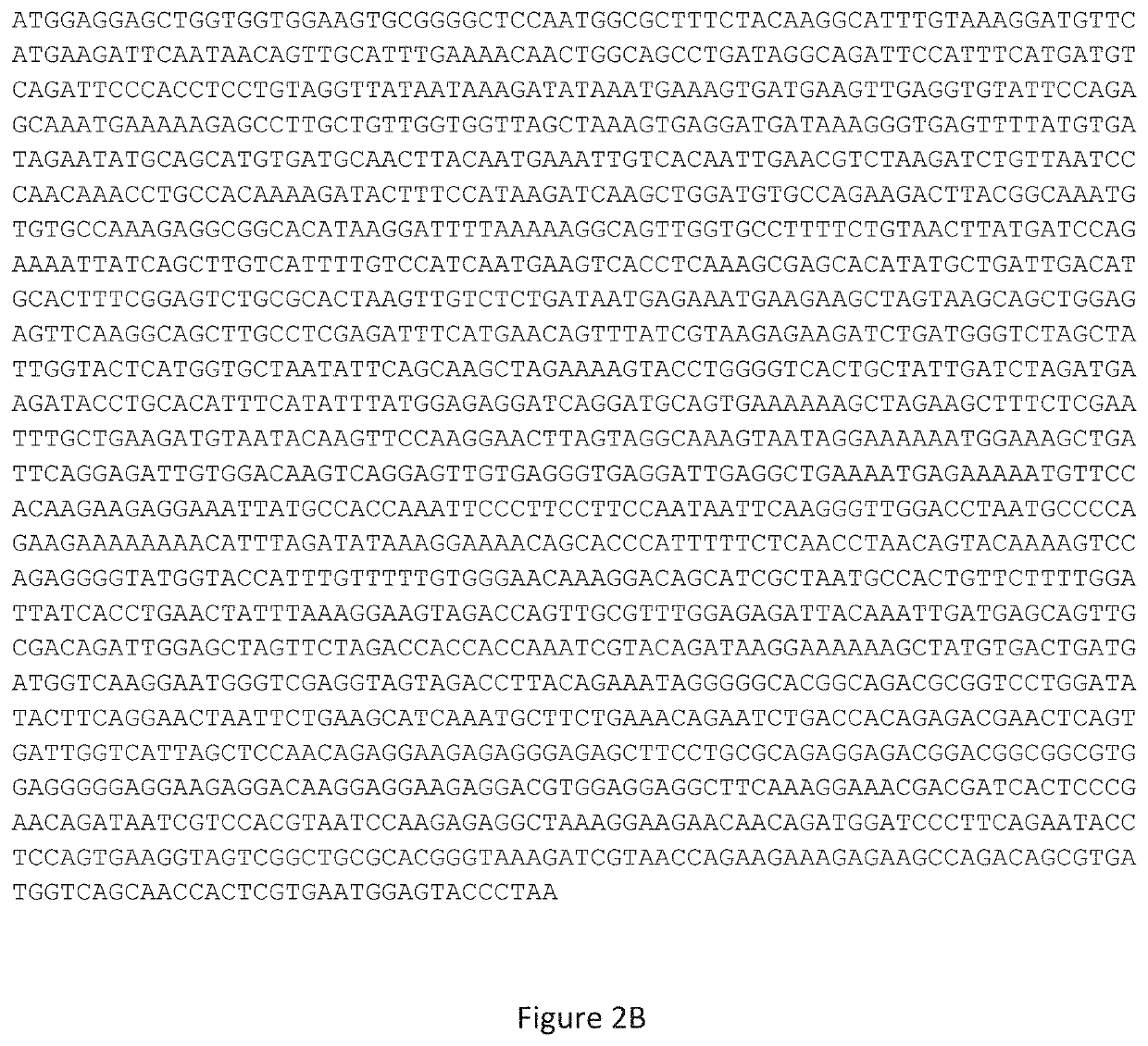Adeno-associated viral vector-mediated gene therapy for treating fragile x-associated disorders
a gene therapy and adenovirus technology, applied in the field of gene therapy, can solve the problems of ineffective treatment of lack of life-long care, and inability to effectively address cognitive impairment and autistic behavior of individuals with fxs
- Summary
- Abstract
- Description
- Claims
- Application Information
AI Technical Summary
Benefits of technology
Problems solved by technology
Method used
Image
Examples
example 1
Hippocampal Expression Levels of Total FMRP in Treated and Untreated Mice
[0107]In this study, hippocampal expression levels of total FMRP were demonstrated to be similar in untreated wild-type mice and in Fmrl-KO mice injected with AAV9-Fmrl-Iso7.
[0108]Samples of the mouse hippocampus were dissected from untreated C57BL / 6 mice, and Fmrl-KO mice after intra-cerebroventricular and intra-cisterna magna injection with AAV9-Fmrl-Iso7 at PND 2, as described above. Hippocampi were collected at PND 25-32 and prepared for SDS-PAGE electrophoresis using 1 mM dithiotherital, and the proteins were transferred to nitrocellulose for western blotting; the blots were stained with anti-FMRP antibody (5C2, Biolegend, #MMS-5232).
[0109]A representative western blot of brain hippocampal lysates (10 μg total protein) from untreated C57BL / 6 mice, and Fmrl-KO mice after intra-cerebroventricular and intra-cisterna magna injection with AAV9-Iso7 at P2 is provided in FIG. 4A. Hippocampi were collected at P25-...
example 2
Representative Expression of FMRP Isorform 7 Transgene in a Neonatal Fmrl-KO Mouse Pup
[0112]Expression of FMRP isorform 7 transgene in a neonatal Fmrl-KO mouse pup was studied one month after i.c.v. plus i.c.m injection of the AAV9-Iso7 into the neonatal Fmrl-KO mouse pup (at PND 2). A sagittal brain section was obtained from the mouse pup at postnatal day (PND) 31. The sagittal brain section was stained with anti-FMRP antibody and visualized via immunofluorescence at PND 31, as described in more detail below.
[0113]About 30 days post-injection, the AAV9-Fmrl-Iso7-treated-mice were anesthetized using a Ketamine-Xylazine solution then transcardially perfused with PBS, followed by 4% paraformaldehyde in PBS (pH 7.4) followed by 30% sucrose in PBS for 24-48 hours. Serial coronal sections were cut at a thickness of 25 μm using a cryostat (Leica Microsystems, Wetzlar, Germany). Free-floating sections were washed with PBS and antigen retrieval. Monoclonal mouse anti-FMRP 5c2 was used at a ...
example 3
Natural Cellular Co-Distribution of MeCP2 and FMRP Protein Expression in Wild-Type Mouse Brain
[0115]This study was performed to demonstrate the natural co-distribution of MeCP2 and FMRP expression in wild-type mouse brain. A sagittal brain section was obtained from a C57 / BL6 wild-type mouse at PND 31, using the same technique as described in Example 2. The sagittal brain section was stained with anti-FMRP antibody and anti-MeCP2 antibody (rabbit monoclonal from Cell Signaling Technology, 1 to 1000 dilution) and visualized via immunofluorescence. After overnight incubation, five washes with TBS for 10 min each were carried out and secondary antibodies diluted in TBS containing 5% goat serum were applied. The sections incubated with anti-FMRP were labeled with goat anti-mouse Alexa Fluor 488 and goat anti-rabbit Alexa Fluor 594 (1:1000; Jackson ImmunoResearch Laboratories. West Grove, PA). The images were captured using a laser-scanning confocal microscope at 10, 40, or ×100 magnifica...
PUM
| Property | Measurement | Unit |
|---|---|---|
| Composition | aaaaa | aaaaa |
| Fragility | aaaaa | aaaaa |
Abstract
Description
Claims
Application Information
 Login to View More
Login to View More - R&D
- Intellectual Property
- Life Sciences
- Materials
- Tech Scout
- Unparalleled Data Quality
- Higher Quality Content
- 60% Fewer Hallucinations
Browse by: Latest US Patents, China's latest patents, Technical Efficacy Thesaurus, Application Domain, Technology Topic, Popular Technical Reports.
© 2025 PatSnap. All rights reserved.Legal|Privacy policy|Modern Slavery Act Transparency Statement|Sitemap|About US| Contact US: help@patsnap.com



